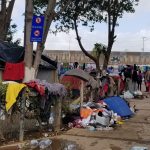On Tuesday evening, U.S. President Donald Trump solemnly declared “a growing humanitarian and security crisis” on the U.S. border with Mexico that demands urgent action in the form of billions of dollar to erect a border wall.
The “crisis” that Trump described echoed his standard anti-immigrant rhetoric, referencing “dozens of families whose loved ones were stolen by illegal immigration” through violent crimes allegedly committed by undocumented immigrants. It was his latest evocation of an “invasion” of dangerous migrants whose access to the United States presents a clear and present danger to American citizens.
Tragically, there is indeed a humanitarian crisis underway at the border, but it’s of the U.S. government’s own making. It’s a crisis rooted in the fear and suffering that the Trump administration willfully imposes on asylum seekers by impeding their ability to apply for asylum in the United States – in direct violation of the United States’ obligations under both domestic and international law. It does so via a policy called “metering,” the equivalent of a bureaucratic war of attrition which strictly limits the flow of asylum seekers awaiting initial interviews to a trickle of only 15 to 30 per day.
The result? Thousands of asylum seekers with little or no means of subsistence are relegated to weeks or months of uncertain waiting at the border for an opportunity to apply for asylum. “Metering” pits the limitless resources of the U.S. government against those of desperate, impoverished asylum seekers, and effectively weaponizes hunger, fear, and frustration to drive them away more effectively and discreetly than tear gas or truncheons.
“Metering” condemns asylum seekers to penury and humiliation and fuels desperation that can prompt them to return home to potentially deadly peril or seek alternate routes over the border in search of sanctuary in the United States. Those alternate routes may be dangerous, but might offer asylum seekers better odds of getting to the United States than formal asylum claim channels. Syracuse University’s Transactional Records Access Clearinghouse (TRAC) last month published a report indicating that immigration judges rejected a record-high number of asylum cases in 2018 – 65 percent of the more than 42,000 total asylum cases decided in the fiscal year ending September 30, 2018. That total marks the highest number of such rejections since the TRAC started compiling data in 2001.
Trump has also created a legal crisis on the U.S.-Mexico border by flouting domestic and international legal obligations to asylum seekers. People escaping persecution and torture who come to the United States have the right to apply for asylum and protection under the UN Protocol Relating to the Status of Refugees, an international treaty which the United States signed and ratified. The Protocol stipulates that asylum seekers are legally allowed to remain in the country where they have sought asylum and avoid deportation to countries where they may be harmed. The U.S. government also has a legal obligation under the Protocol to conduct individualized screenings of migrants arriving at the U.S. border who are fleeing persecution in their countries of origin.
Refugee status was established in order to provide international protection for those with no other option – those whose governments are unable or unwilling to protect them at home. In countries where widespread violence and intimidation of citizens go unchecked, and where governments refuse to investigate or punish perpetrators, survivors may have no choice but to flee.
In his address, Trump declared that the situation at the U.S.-Mexico border leaves the United States with “a choice between right and wrong, justice and injustice.” Trump should recognize the inherent wrong and injustice of his administration’s current border policies and instead establish a humane immigration system and border enforcement policies that preserve health and human rights, rather than scapegoating people desperately seeking protection from violence and persecution.

